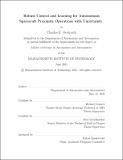Robust Control and Learning for Autonomous Spacecraft Proximity Operations with Uncertainty
Author(s)
Oestreich, Charles E.
DownloadThesis PDF (3.224Mb)
Advisor
Linares, Richard
Gondhalekar, Ravi
Terms of use
Metadata
Show full item recordAbstract
As the number of spacecraft and debris objects in orbit rapidly increases, active debris removal and satellite servicing efforts are becoming critical to maintain a safe and usable orbital environment. At the same time, future unmanned solar system exploration missions are targeting challenging destinations for scientific data collection. For practical realization of these technologies, the involved spacecraft must be highly autonomous and able to perform complex proximity operations maneuvers in a safe manner. This requires that the guidance and control system must reliably address inevitable sources of uncertainty while performing the maneuvers.
This thesis seeks to improve the flexibility and performance of autonomous spacecraft in uncertain scenarios by leveraging robust control theory and reinforcement learning. A novel algorithm, termed online tube-based model predictive control, is proposed and applied to a simulated mission involving the intercept of an tumbling target with unknown inertial properties. This algorithm demonstrates superior performance and exhibits less reliance on initial knowledge of the uncertainty when compared to standard robust control methods. Separately, reinforcement learning is utilized to develop a policy (to be employed as a feedback control law) for six-degree-of-freedom docking with a rotating target. The policy provides near-optimal performance in a simulated Apollo transposition and docking maneuver with uncertainty in the initial conditions. Both of these methods enhance the level of autonomy in their respective scenarios while also maintaining practical computational run-times. As such, this thesis represents an incremental step towards making missions based on highly autonomous proximity operations a reality.
Date issued
2021-06Department
Massachusetts Institute of Technology. Department of Aeronautics and AstronauticsPublisher
Massachusetts Institute of Technology